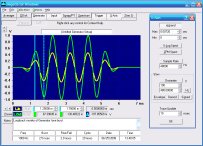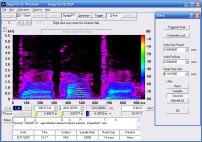![[LogoShip]](logo5.png)
Software for Windows
Science with your Sound Card!


Features:
Oscilloscope
Spectrum Analyzer
8-Channel
Signal Generator
Spectrogram
Pitch Tracker
Pitch-to-MIDI
DaqMusiq Generator
(Free Music... Forever!)
Engine Simulator
LCR Meter
Remote Operation
DC Measurements
True RMS Voltmeter
Sound Level Meter
Frequency Counter
Period
Event
Spectral Event
Temperature
Pressure
MHz Frequencies
Data Logger
Waveform Averager
Histogram
Post-Stimulus Time
Histogram (PSTH)
THD Meter
IMD Meter
Precision Phase Meter
Pulse Meter
Macro System
Multi-Trace Arrays
Trigger Controls
Auto-Calibration
Spectral Peak Track
Spectrum Limit Testing
Direct-to-Disk Recording
Accessibility
Data Logger
Waveform Averager
Histogram
Post-Stimulus Time
Histogram (PSTH)
THD Meter
IMD Meter
Precision Phase Meter
Pulse Meter
Macro System
Multi-Trace Arrays
Trigger Controls
Auto-Calibration
Spectral Peak Track
Spectrum Limit Testing
Direct-to-Disk Recording
Accessibility
Applications:
Frequency response
Distortion measurement
Speech and music
Microphone calibration
Loudspeaker test
Auditory phenomena
Musical instrument tuning
Animal sound
Evoked potentials
Rotating machinery
Automotive
Product test
Contact us about
your application!
DDisk Units
Controls: DDisk Dialog >> Units
Macro: PosnUnits
- Bytes
- Samples
- Seconds
- HH:MM:SS
- Local Time
- UTC Time
These radio buttons control the units used for DDisk Write Size Preset, Write PreStart, and Read Step Size in the DDisk Controls dialog. They also control the units used for the DDisk Position readout and Sgram End readout.
Note, however, that Local and UTC Time modes use absolute times and only apply to the position readouts while reading file data. When Local or UTC are selected, the Preset, PreStart, and Step controls will actually use relative HH:MM:SS mode, as will the live position readout during DDisk recording.
Local time is especially useful when viewing very long recordings, where you have noted the time of an event as it happened, and later want to go to that place in the file. Of course, you could instead note the elapsed bytes, samples, or HH:MM:SS time from the position readout during the DDisk recording, and use that later.
But that requires that you watch the readout. The Local Time method works even if you are in an isolated chamber, monitoring the experiment; all you need is a watch or clock. And it works for files created entirely by macros via computation on live data, that don't even use normal DDisk recording and hence don't automatically have a position readout.
Note that Local and UTC Time always use 24 hour time; there is no way to enter or view 12 hour AM/PM time. For files that cross midnight, or even extend over multiple days, there is a relative day indicator that appears before the hours entry. Instead of a value like 12:34:56.78900, you would see 0> 12:34:56.789 on the starting day, and when the file position is moved past midnight it would show 1> 00:00:00.001, etc.
The fractional seconds display is reduced from 5 to 3 decimal places to make room for this day indicator. (It's assumed that you will be using very slow effective sample rates for such long files, such that millisecond resolution is more than adequate.)
Instead of the radio buttons, you can use ALT+SHIFT+D to rotate through all the units options. This works whenever the DDisk Controls dialog is visible, or whenever the DDisk position readout is in use for DDisk read or write.
When the DDisk position readout is visible, you can just toggle the units button next to it to do the same thing.
Macro Notes:
You may use either mnemonics or numeric values to set DDisk Units. For example, PosnUnits=Bytes is equivalent to PosnUnits=0, where the numeric value can be any numeric variable or expression.
0 = Bytes = Bytes
1 = Smpls = Samples
2 = sec = Seconds
3 = HMS = HH:MM:SS
4 = Local = Local Time
5 = UTC = UTC Time
Note that if you use a mnemonic in an {\b IF} test, it must be in quotes: IF.PosnUnits="Smpls".
See also Direct-To-Disk (DDisk) Toggle, DDisk Controls Dialog
- Back to DDisk Read Step Size
- Ahead to DDisk Cursor Units Toggle
- Daqarta Help Contents
- Daqarta Help Index
- Daqarta Downloads
- Daqarta Home Page
- Donate to Daqarta
Questions? Comments? Contact us!
We respond to ALL inquiries, typically within 24 hrs.INTERSTELLAR RESEARCH:
Over 45 Years of Innovative Instrumentation
© Copyright 2007 - 2026 by Interstellar Research
All rights reserved